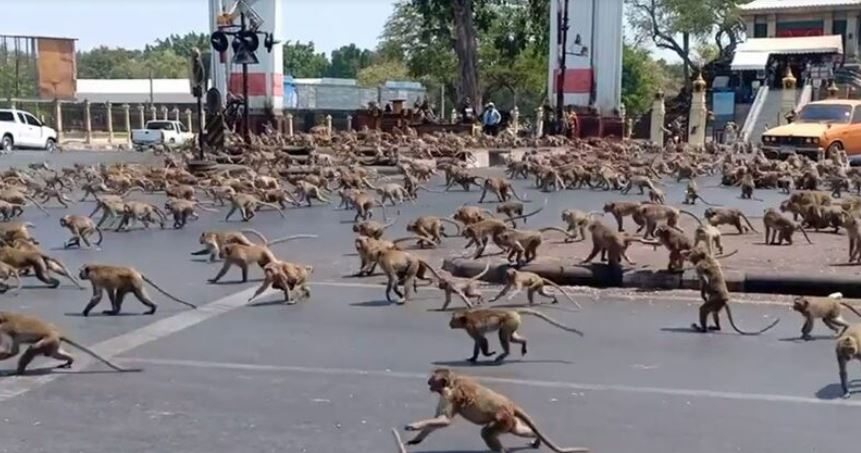AN ARMY of thousands of monkeys have run a city in central Thailand into the ground.
Several stores and businesses have been forced to shutter and relocate, investors have halted their investments, and shoppers have all but entirely vanished from Lopburi.
An army of 3,500 macaques has overrun a city in Thailand
Reuters – Check Copyright HolderOnce a hub for tourists, the city has suffered as a result of the coronavirus pandemic[/caption]
AFPThe monkeys have become much more violent towards humans since the lockdowns[/caption]
The Thai city, once a thriving hub for tourists who flocked to see the city’s wild macaques, has now been completely overrun by the 3,500-strong army that have taken control.
Some locals have fled, while others have been forced to barricade their homes in a desperate bid to protect themselves against the rampaging monkeys.
“We live in a cage but the monkeys live outside,” Lopburi local Kuljira Taechawattanawanna told AFP.
Taechawattanawanna went on to say that she has had to cover her terrace to prevent the mob from raiding her home in search of food.
Lopburi has had to establish several no-go zones throughout the city, as some of these areas have been taken over by warring rival monkey gangs.
At first the locals attempted to keep the animals at bay by providing them with junk food, but that plan backfired and seemed to only make the monkeys more violent.
They had been giving the monkeys sweets, fizzy drinks and cereal – sugary treats which are well known to make monkeys more hyper and sexually-active.
“Sugary foods can increase the productivity of the monkeys and stimulate the monkeys to reproduce more,” says Suttipong Kamtaptim, from the Department of National Parks.
Female monkeys already have the ability to reproduce twice per year, and the frequency with which they have been given sugar has meant that these monkeys have had an abundance of energy to do so.
Pre-pandemic, monkey and man lived in harmony in the city – the macaques attracted tourists to the city, and those tourists would buy bananas to feed the animals and pose with them.
But that balance quickly collapsed when lockdowns stopped the steady flow of tourism, leaving the macaques desperate for a new food source.
“The monkeys are hungrier and more aggressive than before,” Somsaksri Janhon, a market-stall seller, told the Guardian.
“They take anything they can. The comb, the mirror. If I leave the food unattended they steal the food as well.”
“They’re so used to having tourists feed them and the city provides no space for them to fend for themselves,” Supakarn Kaewchot, a government veterinarian, told Reuters.
“With the tourists gone, they’ve been more aggressive, fighting humans for food to survive.
“They’re invading buildings and forcing locals to flee their homes.”
The monkeys can now be found everywhere. They sit atop rooftops, ready for ambush, they run riot on the roads, and they even rob passing cars.
Thailand’s Department of National Parks has had to launch a sterilisation program, in the hope that they can curb some of the rapidly-growing monkey population in the city.
Back in 2020, authorities were able to use large fruits to lure several hundred monkeys into cages so that they could sterilise them.
At first they were successful, managing to catch some 500 monkeys on a daily basis, but now the monkeys have caught on to their tactics.
Kamtaptim said that catching the macaques is no longer an easy feat.
“As soon as they see our faces they remember. They know what we’re going to do,” says Kamtaptim.
“In some groups, the head of the group tries to stop their clan from going into the cage.”
He said that now, managing to capture a mere 20 monkeys is proving to be a challenge.
There have even been cases of the monkeys robbing cars
GettySterilisation efforts have failed as the monkeys in the city have become wise to these tactics[/caption]

